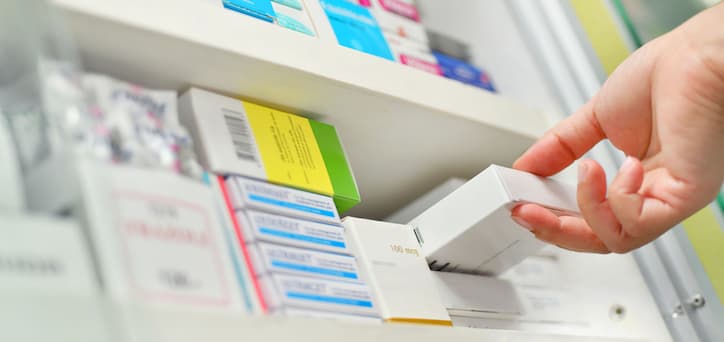Medication errors in hospital pharmacies

Published - 27/09/2023
When the hospital discharges patients, they often collect prescription medication from an outpatient pharmacy to help them manage their condition or recover from home. However, hospital pharmacy errors can cause patient harm, potentially delaying recovery or affecting long-term health.
This article outlines the common medication errors in hospital pharmacies and how often they occur. Learn more about the process of resolving patient safety incidents, holding the pharmacist and cooperation responsible and when medical professionals are in breach of patient safety laws.
Click on a link to jump to that section:
Learn about the common types of dispensing error that can breach patient safety
We discuss the rate of medication error in hospital pharmacies and why this is important
Learn about pharmacy practice that can lead to medication dispensing errors.
The patient can become severely unwell if they receive the wrong drug
Understand how to avoid hospital pharmacy errors by improving the dispensing process
The pharmacist, technician, supervisor, or manager
If you have been affected by a negligent drug dispensing error, you could be eligible to make a claim.
What are common hospital pharmacy errors?
There are several different common drug errors, particularly in medication administration. However, some mistakes are more typical than others. Some of the most common medication error types include:
- Wrong medications or doses: Pharmacies provide someone with the wrong drug or the right drug in the wrong volume. There are several reasons that a patient could receive the wrong drug by mistake.
- Unauthorised drugs: Pharmacists must check that the prescribing doctor is authorised to prescribe medication.
- Mislabelled drugs: medication packages with incorrect labelling or drug name can result in patients receiving the wrong drug or dose.
- Instruction errors: The pharmacist's instructions differ from those given by the prescribing doctor, or if the printed instructions are incorrect, while the medication is correct.
- Expired drugs: If a pharmacist dispenses a drug that has passed its expiration date.
- Generic drug substitutions: if a pharmacist substitutes a generic drug such as a painkiller or antibiotic without notifying the patient or consulting medical history.
How common are hospital pharmacy errors?
There are no definitive rates for hospital pharmacy medication errors. Dispensing error rates in hospital pharmacies range from 0.02 – 2.7%. This is a small percentage, but with 2.3 million prescriptions being dispensed from hospital pharmacies, up to 62,100 errors can occur daily.
Hospital medicine administration has a further error rate of 3 - 8%. There is a distinct gap between administration and dispensing errors. Medication administration errors can result from communication errors, poor working conditions or human error. On the other hand, hospital and community pharmacies have an automated dispensing process and electronic prescriptions, which help to keep the error rate low.
It's important to record patterns in dispensary errors to uncover underlying problems and systematic weaknesses. The next section discusses the common causes of dispensing mistakes in hospitals.
What can lead to mistakes in hospital pharmacies?
There are plenty of issues that can lead to mistakes in hospital pharmacies, including:
- Human error: Someone especially tired or overworked is likelier to make mistakes such as giving someone the wrong drug or dose.
- Inadequate staffing: Inexperienced Staff members or low coverage of trained staff can lead to excessive pressure on trained staff, who may make more errors.
- Training: Poor or infrequent training in hospital pharmacies can lead to misunderstandings of tasks and the steps involved in safe medication practices.
- Communication: Poor communication between staff members, both written, digital or verbal, can lead to someone receiving the wrong medication or the wrong dose.
- Procedures and technology: Outdated systems such as handwritten prescriptions or manual data entry can lead to dispensing errors and affect patient safety.

What are the consequences of hospital dispensing errors?
There can be some major consequences of hospital dispensing errors. Some of the main implications of receiving the wrong medication include the following:
- Adverse drug reactions: the patient can suffer from a negative drug interaction, an allergic reaction or severe side effects.
- Toxicity: Toxicity occurs from consuming too much of a drug. This can happen if the patient is given a higher dosage than they need or is safe.
- Organ damage: In serious cases, taking incorrect medication can cause potentially significant or permanent damage to your organs or tissues.
- Death: In more extreme cases, the patient can suffer from severe side effects, drug interactions or allergies that lead to death. In this case, a family member may be able to make a clinical negligence claim.
- Prolonged recovery: If medication is ineffective, your condition may worsen or persist. In this case, you may need to take unpaid leave or pay significant medical expenses. Learn about making a clinical negligence claim if you lost work due to a drug dispensing error.
Speak to a clinical negligence lawyer for any significant losses due to a pharmacy error.
How to prevent dispensing errors in hospitals?
There are several steps involved in improving medication safety in a hospital pharmacy. The first is systems updates. All pharmacies should operate with up-to-date systems to ensure accurate tracking of electronic prescriptions and hospital medication stock tracking.
Secondly, pharmacies should work on recruitment programs to improve staffing in deprived pharmacies and hospitals.
Thirdly, pharmacy staff should receive regular training on protocols and pharmacy service. Staff need to understand how to accurately report errors so the proper authorities can identify skill or knowledge gaps.
Who is responsible for hospital dispensing errors?
Hospital pharmacy errors can come from anyone, from pharmacy technicians to supervisors. You should report every mistake to the supervising pharmacist, who will notify management or report to the necessary authorities. The hospital is not responsible for the medication errors of the registered pharmacy and vice versa with hospital administration errors. However, the NHS Trust who are the administrators of the hospital may be responsible in certain circumstances. If you are unsure who to contact about a medical mistake, the hospital reception should be able to point you in the right direction.
It's important to understand at which level pharmacy errors occur so that the healthcare system can tailor training programs towards the appropriate level: technicians, pharmacists, supervisors or management.
When to seek legal advice
If you have been injured or your life has been significantly affected by pharmacy errors, you may be eligible for negligence compensation claim against the hospital pharmacy responsible. You will need to prove the following:
a - Clinical negligence – the pharmacy staff failed to uphold an adequate standard of care.
b - Probable cause – the negligent behaviour directly resulted in patient harm, independently of any other reason.
It's good practice to keep your prescriptions and medication packaging, especially if dispensing errors occur. You will need to provide as much detail to the pharmacy staff about the error, including details of everyone involved, the error in question, and the prescribed and issued drug.
Wake Smith solicitors offer a free consultation to discuss your case. With a no-win, no-fee approach, you may have nothing to pay if your claim is unsuccessful. We have a specialist team of clinical negligence solicitors , so contact one of us today to discuss your case.

